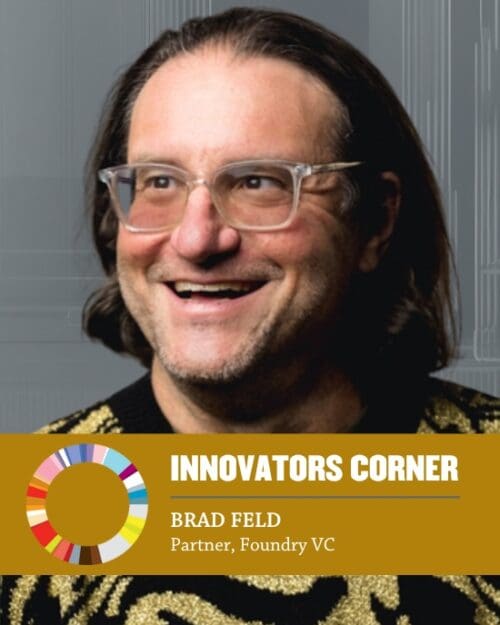Innovators Corner: Brad Feld on the Power of Mentorship and “Giving First”

At the Global Entrepreneurship Congress, Techstars co-founder Brad Feld challenges communities to lead with generosity, listen deeply and support founders first.
In June, the Society of Innovators at Purdue Northwest joined thousands of entrepreneurship leaders from across the world at the Global Entrepreneurship Congress (GEC) in Indianapolis. The four-day event celebrated bold thinking and grassroots innovation—and no session captured that spirit more than a fireside chat with Brad Feld, co-founder of Techstars and long-time advocate for startup communities.
In conversation with Global Entrepreneurship Network (GEN) President Jonathan Ortmans, Feld shared lessons from his new book, Give First: The Power of Mentorship, while reflecting on his decades-long journey helping founders build companies—and helping cities build ecosystems.
Give First: A Philosophy for Builders
Feld’s central message was simple: lead with generosity. Giving first, he said, doesn’t mean expecting nothing in return. Rather, it’s the belief that if you consistently invest time, knowledge and trust into a community, the benefits will compound, often in unexpected ways.
“It’s not a religion with rules,” Feld said. “It’s a philosophy. You put energy into something not knowing exactly what you’ll get back, when, or from whom. But over time, that energy comes back to you.”
This mindset has helped shape startup ecosystems in Boulder, Colorado and beyond—and is one of the core values behind Techstars’ mentorship-driven accelerator model.
Good mentorship is rooted in listening. It’s not about telling someone what to do. It’s about helping them think more clearly.
Redefining Mentorship
Feld emphasized that mentorship is not about handing out answers. Instead, effective mentors provide data, ask good questions and share relevant experiences. “Good mentorship is rooted in listening,” he explained, drawing inspiration from his father, a physician who was known for sitting with patients, not talking over them.
In startup ecosystems, this approach helps founders navigate complex challenges while still owning their decisions. “It’s not about telling someone what to do,” Feld said. “It’s about helping them think more clearly.”
From Feeders to Instigators
Feld also revisited ideas from his influential book Startup Communities, where he originally described founders as leaders and everyone else—investors, educators, government officials—as “feeders.” While this founder-first framing was intentional, Feld admitted it had unintended consequences. Some ecosystem contributors felt sidelined.
Over time, he adjusted his thinking and introduced a new term: instigators—individuals who work within organizations but play active leadership roles in supporting startups. “Startup communities are led by founders and instigators,” Feld clarified. “It’s about people, not hierarchies.”
Global Norms, Local Action
Feld concluded the conversation with a call to action: build entrepreneurial cultures that transcend geography. He shared a moving story from a Startup Weekend in Brazil, where a young attendee gifted him a hat and said, “You changed my life.” The startup mindset, Feld noted, gives people agency and dignity—and communities must keep nurturing it.
“Entrepreneurship is messy, uncertain and incredibly human,” he said. “But when we build on values of trust, generosity and shared purpose, we create something lasting.”